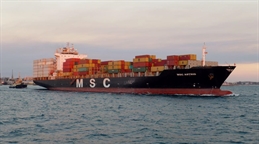
MSC Mediterranean Shipping Company (MSC) announced that it has taken a major step to help protect blue whales and other cetaceans living and feeding in the waters off the coast of Sri Lanka by modifying navigation guidance in line with the advice of scientists and other key actors in the maritime sector.
MSC said it began in mid-2022 to voluntarily re-route its vessels passing by Sri Lanka, on a new course that is approximately 15 nautical miles to the south of the current traffic separation scheme (TSS) for commercial shipping.
Specifically, MSC has followed guidance based on research surveys completed by the International Fund for Animal Welfare (IFAW), with the World Trade Institute (WTI), Biosphere Foundation, University of Ruhuna (Sri Lanka), Raja and the Whales and University of St Andrews (UK), and additionally endorsed by the World Wide Fund for Nature (WWF), to change the routing for its vessels.
It said westbound ship traffic is now limited to a latitude between 05 30N and 05 35N, and eastbound traffic is limited to a latitude between 05 24N and 05 29N in order to avoid designated cetacean habitats.
An exception, however, has been made for vessels embarking and disembarking for safety reasons in Galle, including in case of adverse weather. Additionally, smaller feeder ships sailing around the Bay of Bengal will reduce their speed to less than 10 knots in this area.
Sri Lanka lies in the Indian Ocean, between Asia and Europe, and the port of Colombo is a major transhipment hub for global trade.
Reducing the risk of ship strike by as much as 95%
"The area off its southern coast is one of the busiest shipping lanes in the world and is also inhabited by large populations of cetaceans, meaning that these animals may be at risk of colliding with ships," MSC said.
"Simulations have shown that moving the official shipping lane 15 nautical miles to the south could reduce the strike risk to blue whales by as much as 95%," it added, noting, however, that despite years of advocacy, the shipping industry and NGOs, the boundaries of the official shipping line have not been reassigned to reduce the risk of ship strikes on cetaceans.
MSC noted that it takes various measures to protect marine wildlife, from adapting shipping service networks to keep away from designated whale breeding and feeding grounds, to reducing vessel speed and re-routing ships to avoid reported marine wildlife populations.
"We believe that the commercial shipping sector has an important role to play in protecting cetaceans, specifically in helping to reduce the risk of ship collisions with whales," said Stefania Lallai, vice president of Sustainability at MSC Mediterranean Shipping Company.
In Sri Lanka specifically, the liner shipping industry led by the World Shipping Council, of which MSC is a member, has advocated creating a new official marine traffic scheme that is fully separated from the blue whale feeding area.
It is hoped that this will soon become a reality, so all large-scale commercial marine traffic moves to the more southerly zone that MSC ships are now guided to follow.
"In the meantime, MSC urges all other ship operators to consider choosing a more southerly route past Sri Lanka, to significantly reduce the possibility of whale strikes," the Swiss-headquartered shipping line said.



